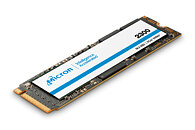Friday, May 15th 2020

Micron Delivers Client NVMe Performance and Value SSDs With Industry-Leading Capacity Sizes and QLC NAND
Micron Technology, Inc., today announced new client solid-state drives (SSDs) that bring NVMe performance to client computing applications, freeing laptops, workstations and other portables from legacy architectures that can rob devices of battery power, performance and productivity. The Micron 2300 SSD combines the power and density needed to drive compute-heavy applications in a compact form factor with the reduced power consumption modern mobile users demand. For the first time, Micron brings together NVMe performance and low-cost quad-level-cell (QLC) NAND in the Micron 2210 QLC SSD. It combines fast NVMe throughput and Micron's leadership in QLC technology to offer flash capabilities at hard disk drive-like price points while reducing power consumption by 15 times when compared to hard drives."Ninety percent of client platforms will ship NVMe SSDs within the next year, and the market is fast bifurcating into mainstream and value market segments," said Roger Peene, vice president of marketing, Storage Business Unit, Micron. "Our two new client SSDs, the 2300 and 2210, are optimized for each segment. The 2300 offers outstanding power performance, while the 2210 delivers compelling price performance by using Micron's industry-leading QLC NAND."
Both SSDs introduced today are built on Micron's innovative 96-layer 3D NAND technology to deliver power savings, right-sized capacity and compact form factors that enable flexible designs.3 They also deliver enhanced client security features and capabilities for protecting data, with TCG Opal 2.0 and TCG Pyrite 2.0 support.
Micron 2300 Solid-State Drive with NVMe
The Micron 2300 SSD is designed for applications that demand high performance and industry-leading capacities in the popular M.2 form factor. Features include the ability to:
The Micron 2210 SSD bridges the gap between the low cost of hard disk drives and the performance, reliability, low power and security of SSDs. It uses high-density, cost-efficient QLC architecture that Micron first brought to the data center. Features include the ability to:
Both SSDs introduced today are built on Micron's innovative 96-layer 3D NAND technology to deliver power savings, right-sized capacity and compact form factors that enable flexible designs.3 They also deliver enhanced client security features and capabilities for protecting data, with TCG Opal 2.0 and TCG Pyrite 2.0 support.
Micron 2300 Solid-State Drive with NVMe
The Micron 2300 SSD is designed for applications that demand high performance and industry-leading capacities in the popular M.2 form factor. Features include the ability to:
- Maximize for data-intensive workloads encompassing CAD, graphical design and video editing for faster application load times and responsiveness.
- Offer a wide range of capacity points, from 256 GB up to 2 TB.
- Fit a broad set of desktop and mobile design needs with a small, dense, M.2 form factor (22x80).
- Achieve up to 3,300 MB/s sequential reads and up to 2,700 MB/s sequential writes.
The Micron 2210 SSD bridges the gap between the low cost of hard disk drives and the performance, reliability, low power and security of SSDs. It uses high-density, cost-efficient QLC architecture that Micron first brought to the data center. Features include the ability to:
- Improve application load times and responsiveness with fast NVMe making it ideal for performance-sensitive applications where hard disk drives can't keep up.
- Offer a wide range of capacity points from 512 GB up to 2 TB in the M.2 (22x80) form factor.
- Provide a cache with greater write endurance and performance with innovative dynamic write acceleration that is optimized for QLC architecture.
- Achieve up to 2,200 MB/s sequential reads and up to 1,800 MB/s sequential writes.

4 Comments on Micron Delivers Client NVMe Performance and Value SSDs With Industry-Leading Capacity Sizes and QLC NAND
I have two QLC drives (OS is an Intel 660p 1TB QLC, data is Samsung QVO 1TB QLC drive), I can live with the low speed but I'm worried about my data integrity in the long term. Both drives were a compromise so I could spare some money to buy Ryzen 3700X instead of 3600(non-X) and 32GB of fast RAM instead of 16GB cheap RAM.
Hopefully I can buy a 2TB NVME TLC drive a year from now, if they still exist.
Also, get a cheap external drive and backup your stuff. QLC or not, hardware fails from time to time and data recovery from SSDs is a pain, if possible at all - hardware encryption used for secure erase often makes it impossible. Always remember there are two types of people: ones who have backups and ones who will have them.